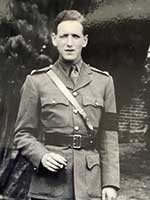|
James Higgins MBE
Late Grenadier Guards
by Major James Gatehouse
formerly Grenadier Guards
|
 James Richard Clinton Higgins died on 1st October 2021, aged 98, one of the last few members of the Regiment to have served in the 4th (Tank) Battalion in Normandy in 1944. James Richard Clinton Higgins died on 1st October 2021, aged 98, one of the last few members of the Regiment to have served in the 4th (Tank) Battalion in Normandy in 1944.
He was born in Patna on 12th January 1923, his father serving in India at that time with the Lincolnshire Regiment. James was educated at Shrewsbury and rowed in the VIII. On his 19th birthday he enlisted into the Regiment, the earliest age then permitted for young men after over 2 years of war, and he was promptly sent to the Guards Depot at Caterham for two months to complete the Brigade Squad, before moving on to Sandhurst. Granted an Emergency War Commission in September 1942, he was then posted to the 2nd (Armoured) Battalion at Warminster, part of the recently formed Guards Armoured Division, equipped with Covenanters and training on Salisbury Plain.
The 2nd Battalion continued its training throughout 1943, moving first to Thetford and then, in June, to Helmsley in Yorkshire, exchanging to Shermans. In April 1944, under a veil of secrecy, the Division was moved towards the south coast and shortly afterwards, as an experienced troop leader, James was transferred across to the 4th (Tank) Battalion, part of the independent 6th Guards Tank Brigade, in command of a troop of Churchills.
On 18th July 1944, fortunately in good weather and without any enemy interference, the Battalion crossed the Channel in tank landing ships, landing at the Gold and Juno Beaches. It then spent about 10 days in the beachhead, in the fields and orchards east of Bayeux, preparing the vehicles and examining enemy equipment that littered the countryside. On 28th July it received the order to move and, after a pretty chaotic and confused approach down narrow, winding lanes in pitch darkness, the following morning they reached the ridge overlooking Caumont. At 8am on 30th July, following a massive preparatory bombardment of the enemy positions by artillery and heavy bombers, the leading tanks of the 4th Battalion ‘rumbled forwards slowly over the skyline and drove down into the valley below, the commanders peering through the thick early morning mist, they could see the smoke billowing upwards from Sept Vents and farther to the left they could just pick out the outline of Lutain Wood’ (the two initial objectives, both occupied by the enemy). The Battalion had to pass through gaps in several minefields before fanning out to assault its objectives and at this point James Higgins’ vehicle struck a mine and erupted in flames. He vividly remembered spending the night in nearby woods, with little protection, while the battle raged around him. In a new vehicle, he was in action, more or less constantly over the next fortnight as the Brigade pushed further south through the close, bocage country, against heavy, cleverly concealed opposition. On 11th August he was wounded again, this time more seriously by a sniper, which resulted in his evacuation from the battlefield and many months were spent recovering in hospital, first in Aldershot and then Ringwood. Many years later he would vividly remember and describe the appalling noise, heat and smell of the battlefield.
After the war James left the Regiment to pursue a career in the film industry. He began this at MGM, licensing films to mining communities in South Wales. Although not an auspicious start, he later became a legendary figure in the UK film distribution sector, working for Paramount/CIC during the 1970s and then taking charge of United International Pictures (UIP) UK during the 1980’s. He oversaw the release of many hugely successful films in the UK, among them ET, the Indiana Jones adventures, Jaws, Grease, Back to the Future and A Fish Called Wanda. He was close to Cubby Broccoli during the Roger Moore and Timothy Dalton era of James Bond films, a period when 007 was helping to keep the UK industry afloat. Barbara Broccoli is recently quoted as saying, ‘James Higgins was a legend, a true gentleman and a dear friend. He will be sorely missed by all of us who knew him’.
He retired from UIP in 1990 and then, from 1991-98, he was president of the Society of Film Distributors, the industry trade body. He was heavily involved in charitable work for the Film and TV Charity (previously the Cinema and Television Benevolent Fund). As a final accolade, in 2012 he received the Outstanding Contribution to the Industry Award at Screen International’s marketing and distribution awards.
Fondly known as ‘Gentleman Jim’ he retained a very keen interest in the business and was always available for advice. ‘He was a man of integrity and great courtesy, quietly influential, with a very dry sense of humour and great fun’. A self-deprecating figure, he accepted early on that distributors were destined to stay out of the limelight. ‘No one ever hears of the distributor, and no one has any idea about what the distributor does. He is a very underrated character in the development, success or failure of a film’, he once commented. Nevertheless, distribution executives held a special lunch to honour him on his 90th birthday.
In 1992 he was appointed MBE for his contribution to the British film industry and, more recently, he was awarded the Legion d’Honneur.
His wife, Wendy, predeceased him. He leaves his three surviving children, Christopher, Abigail, and Tessa, his seven grandchildren and three great grandchildren.
|
|